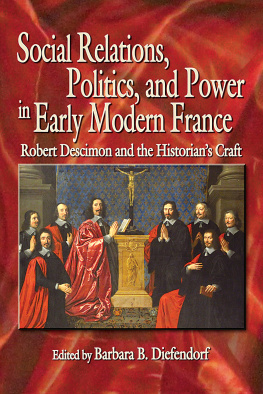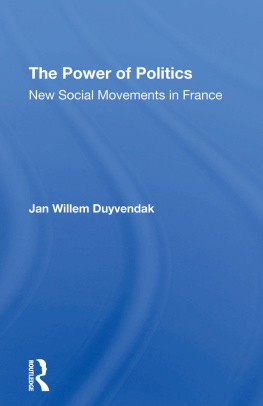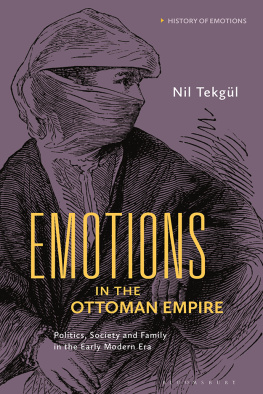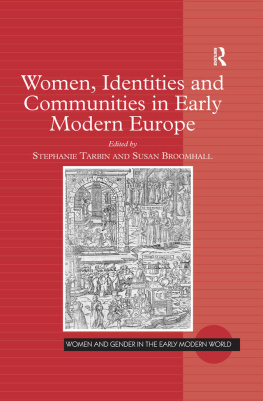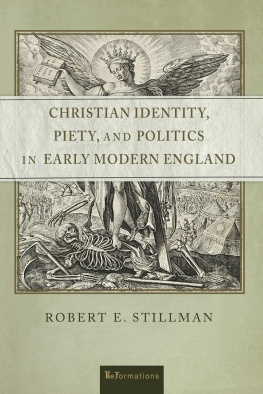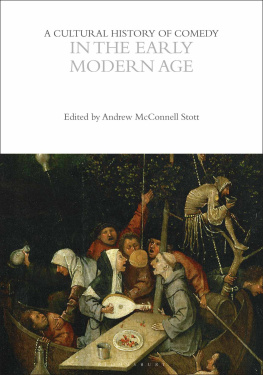Barbara B. Diefendorf
Scott H. Hendrix
Mary B. McKinley
Raymond A. Mentzer
Robert V. Schnucker
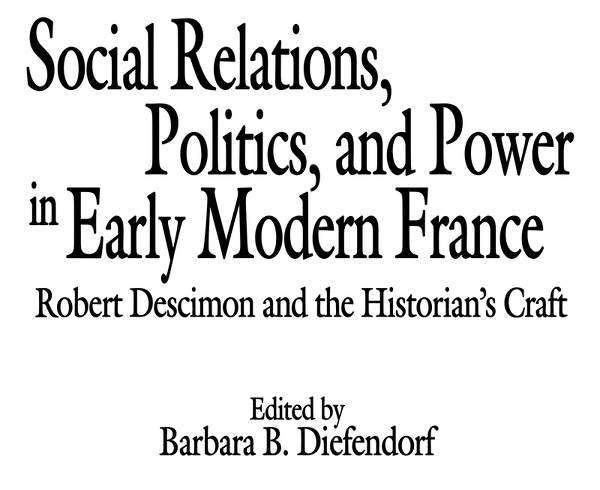

Early Modern Studies 19
Truman State University Press
Kirksville, Missouri
Copyright 2016 Truman State University Press, Kirksville, Missouri, 63501
All rights reserved
tsup.truman.edu
Cover art: Philippe de Champaigne (16021674), Le Prvt des marchands et les chevins de la ville de Paris. Oil on canvas, 1648. Louvre Museum, Paris, Legs du Dr Louis La Caze, 1869.Cover design: Lisa Ahrens
The Library of Congress has cataloged the printed edition as follows:
Library of Congress Cataloging-in-Publication Data
Names: Diefendorf, Barbara B., 1946- editor of compilation. | Descimon,
Robert, honouree.
Title: Social relations, politics, and power in early modern France : Robert
Descimon and the historians craft / edited by Barbara B. Diefendorf.
Description: Kirksville, Missouri : Truman State University Press, [2016] |
Series: Early modern studies ; 19 | Includes bibliographical references
and index.
Identifiers: LCCN 2016009565 (print) | LCCN 2016029104 (ebook) | ISBN
9781612481630 (library binding : alkaline paper) | ISBN 9781612481647
Subjects: LCSH: FranceHistory16th centuryHistoriography. |
FranceHistory17th centuryHistoriography. | Elite (Social
sciences)FranceHistoriography. | Power (Social
sciences)FranceHistoriography. | Political
cultureFranceHistoriography. | Social changeFranceHistoriography.
| FranceSocial conditionsHistoriography. | FrancePolitics and
governmentHistoriography. | Descimon, RobertInfluence. |
HistoriansFranceBiography.
Classification: LCC DC111.3 .S63 2016 (print) | LCC DC111.3 (ebook) | DDC
944/.0307202--dc23
LC record available at https://lccn.loc.gov/2016009565
No part of this work may be reproduced or transmitted in any format by any means without written permission from the publisher.
The paper in this publication meets or exceeds the minimum requirements of the American National Standard for Information SciencesPermanence of Paper for Printed Library Materials, ANSI Z39.481992.
Sequential numbers in square brackets [] in the body of the text refer to page numbers in the print edition: citations appeared as footnotes in the print edition.
Note: Because of display limitations of e-readers, some special characters (e.g., Greek or Hebrew letters, cedillas, characters in Eastern European languages, accents or other diacritical marks) may ont display properly in the e-book version of this work.
Contents
Barbara B. Diefendorf
Jonathan Dewald
Michael P. Breen
Sara Beam
Mack P. Holt
James B. Collins
Hilary J. Bernstein
Philip J. Benedict
Barbara B. Diefendorf
Mark Greengrass, with Marco Penzi and Mark Critchlow
Robert A. Schneider
Robert Descimon
Robert Descimon and the Historians Craft
Barbara B. Diefendorf
Practitioners of early modern French history recognize Robert Descimon as one of the foremost scholars of his generation and the one who has offered perhaps the most profound insights into the nexus of social relations, politics, and power in France as it moved from the age of religious wars into the age of absolutism. Highly focused, heavily documented, and firmly grounded in archival research, Robert Descimons prolific scholarship can appear traditional at first glance. The appearance is deceptive. A look at his footnotes shows the thoughtful use he has made of sociological theory, anthropology, and a wide variety of historical approaches and methods. It is also readily apparent that if he patiently culls genealogical data and constructs collective biographies, or prosopographies, from extensive research in notarial records, it is not for their own sake but rather to use them as tools for the analysis of social relations in an era in which questions of lineage played a crucial part. The role of mid-level elites, and in particular of the Parisian notables who evolved into the nobility of the robe at the end of the sixteenth century, has formed one of the major objects of Descimons research throughout his professional career. His first book, Qui taient les Seize? (1983), a study of the Catholic League that seized control of Paris from 1588 until 1594, revised historians understanding of this radical movement in significant ways. At the same time, it set out an important new argument about the transition within the Parisian elite from an identity rooted in local and communal values to [2] one aligned with the centralizing monarchy and its values and priorities. In the three decades since the publication of Qui taient les Seize?, Robert Descimon has continued to delve deeply into the dynamics of these societal transformations, while also exploring their political ramifications and the power relationships they both fostered and maintained. Independently and in research undertaken in collaboration with students and friends, he has offered valuable new insights into the mentality of ancien rgime elites and into the political foundations of the absolutist state of which they were a part.
Little of Robert Descimons prolific scholarship has been translated, and much of it has been published in journals and collections that are not readily available even to those who read French. His scholarly contributions are as a consequence less known and widely understood than they deserve to be. This book aims to repair that oversight by offering an appreciation and extension of Robert Descimons work to those already familiar with it and to those who are not. Some readers may recognize an allusion to Marc Blochs classic meditation on the practice of history in the subtitles use of the phrase the historians craft. The echo of Blochs Apologie pour lhistoire ou mtier dhistorien, published in English as The Historians Craft, is indeed deliberate. The current work too is a meditation on the questions historians ask and the ways they go about answering them; and Robert Descimon is, as the chapter by Jonathan Dewald in particular shows, a true heir to Marc Bloch and to the Annales tradition that he helped to create. The essays, written by distinguished Anglophone historians of early modern France, explore Descimons many contributions to this field but also, in a more personal vein, reveal something of his influence on the authors own historical practice, as they examine intersections of politics, power, and social relations in a variety of early modern settings. The volume concludes with an essay by Robert Descimon reflecting on his scholarly trajectory and with a bibliography of his many and diverse works.

